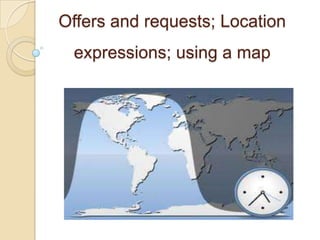
El102 lecture4
- 1. Offers and requests; Location expressions; using a map
- 2. OFFERS & REQUESTS •To make offers we use the expression: Would you like to ……..? Would you like to go to cinema with me? •To make request we use the expressions like: Can I have ….? or Could I have….? Can I have some candies please? Could I have a cup of coffee please?
- 3. Possible answers: I’d love to…. I’d like to ….. Yes, of course. Yes you can. Here you are
- 4. Describing location •To describe the location of a place we can use the following phrases: … is situated/ located …in the east/west/south-east, etc …of; on the north/south/south-west coast of, etc; …in the heart/centre of
- 5. Examples: Vancouver is situated on the west coast of Canada. Òhe art gallery is located in the heart of the city. Mongolia is located in Asia.
- 6. Relative pronouns •Relative pronouns (who, which, etc) introduce relative clauses. We use relative clauses to identify the noun in the main clause. I met a woman. She’s from France. I met a woman who is from France.- relative clause.(The relative clause identifies which woman we are talking about.)
- 7. Relative pronouns - We use who to refer to people. A porter is someone who carries luggage. -We use which to refer to objects or animals. A clock is something which shows the time.
- 8. Relative pronouns •We use where to refer to place. •This is the hotel where we spent our holiday. •That's the restaurant where we met for the first time.
- 9. Some- Any- No We use some, any, and no with uncountable nouns (cheese, coffee, etc.) and plural countable nouns(houses, eggs, etc) some cheese, some houses. Some means a little or a few. We normally use some in positive statements.
- 11. SOME- ANY- NO She’s got some bread./a little/ She’s got some pencils./a few/
- 12. SOME- ANY- NO We can also use some in questions to make offers, requests, or when we expect a positive answer. Would you like some more orange juice?/offer/ Can I have some water, please?/request
- 13. Some- Any- No Affirmativ Interrogat Negative Countable e ive uncount- able some any not any
- 14. Some- Any- No We use any in questions and not any in negations. Have you got any milk? No, I haven’t got any sugar. We can use no instead of not any in negations. They haven’t got any money. They’ve got no money.
- 15. Someone/ something/ somewhere Someone/ somebody(a person), something(a thing) and somewhere(in/to/ at a place) are used in positive statements. There is someone in the kitchen. There is something in the attic.
- 16. Anyone/ANYBODY, Anything/ Anywhere Anyone / anybody, anything and anywhere are used in questions and negations. Is there anything in the box? There isn’t anybody in the room.
- 17. No one/ Nobody /nothing/Nowhere No one/ nobody, nothing and nowhere can be used in negations instead of not anyone/ anybody, not anything and not anywhere. •There isn’t anybody in the garden. •There is nobody in the garden.
- 18. Table of (Some)’s Affirmative Interrogative Negative People Someone Anyone Not anyone Somebody Anybody No one Not anybody Nobody Things Something Anything Not anything Nothing Places somewhere anywhere Not anywhere nowhere
- 19. Table for question Who? Someone/anyone/ no one Somebody/ anybody/ nobody What? Something/ anything/ nothing Where? Somewhere/ anywhere/ nowhere
- 20. Review •That's the restaurant where we met for the first time. (where = at/in which) •I remember the day when we first met. (when = on which) •There was a very hot summer the year when he was born. (when = in which) •Tell me (the reason) why you were late home. (why = for which, but could replace the whole phrase 'the reason for which')
- 21. Who; which; whose Put in the relative who, which or whose where necessary. Example: Peter is the boy ____ rides the blue bike. Answer: Peter is the boy who rides the blue bike.
- 22. Who; which; whose; whom 1) This is the boy ……..had an accident. 2) Yesterday I saw a car ………was really old. 3) Mandy is the girl ……….I met on Friday. 4) The robber stole the car ……….the lady parked in front of the supermarket.
- 23. Who; which; whose 5) This is the man ……….house is on fire. 6) Can I talk to the girl ………is sitting on the bench? 7) The book …………you gave me is great. 8) She likes hamburgers ………are hot. 9) Bill Clinton, was President of the USA, ………has only one daughter.